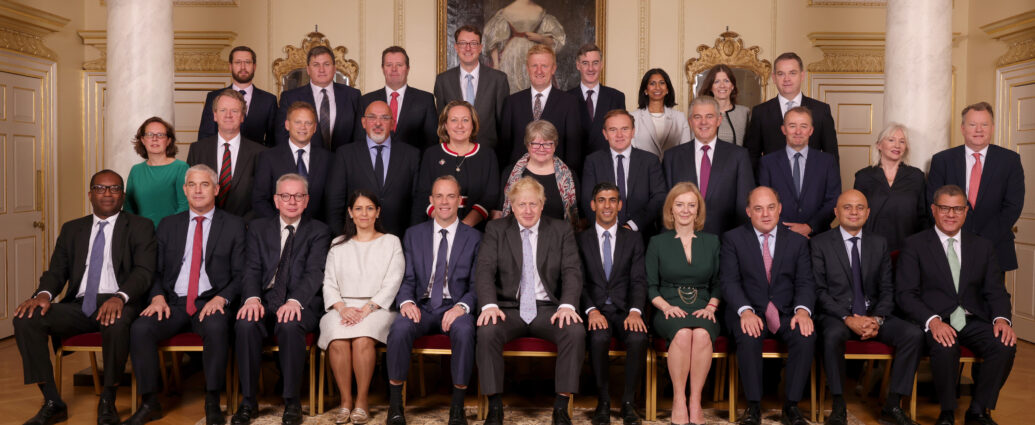Alanya Smith
After Prime Minister Boris Johnson’s announcement of his resignation on Thursday 8th July, Conservative party members have been lining up to takeover leadership of the political party and rebuild public confidence in the House of Commons.
Following a tumultuous week of televised debates and opinion polling, the original eight electives who volunteered themselves have now been reduced to two candidates.
The next leader will decided by members of the Conservative party who will choose between the two remaining candidates; Rishi Sunak and Liz Truss. Of the predicted 160,000 members potentially voting, 39% are aged sixty-five and over.
Rishi Sunak
Having previously served as Chancellor from February 2020, dictating the UK economy and present financial crisis following the first COVID-19 lockdown until his catalytic resignation in June 2022, Rishi Sunak has been favoured in his branded “empathetic” image through the ‘Eat Out to Help Out’ scheme and the infamous car-petrol photography incident. Rumoured to be one of the richest MPs in the House of Commons, the millionaire “attended the exclusive private school Winchester College” before enrolling at Oxford University and later Stanford University. Mr Sunak is married to Akshata Murty, heiress to multi-million dollar-worth tech giant Infosys. They now have two daughters.
Mr Sunak has highlighted that his key goals as Prime Minister would include reducing income tax and increasing corporation tax to battle the rise of inflation, whilst continuing progression to the net zero targets for 2050 implemented following COP26.
Criticism of Mr Sunak inside and outside the Conservative party arose following after Ms Murty’s tax affairs were leaked to the British public, alongside Mr Sunak’s police fines for breaking lockdown rules within Downing Street during 2020. Moreover, Infosys’ delayed withdrawal from Russia during the present war with Ukraine has raised concerns that Mr Sunak and his family are benefiting from the present conflict. Such discoveries have been challenged by the Labour Party:
Has Mr Sunak ever benefited from the use of tax havens?
Whilst The Independent claimed he had, citing Mr Sunak’s listing as a beneficiary of tax havens in the British Virgin Islands and the Cayman Islands during 2020, a spokesperson acting on behalf of Mr Sunak stated they “did not recognise” such claims.
I’m standing to be the next leader of the Conservative Party and your Prime Minister.
Let’s restore trust, rebuild the economy and reunite the country. #Ready4Rishi
Sign up
https://t.co/KKucZTV7N1 pic.twitter.com/LldqjLRSgF
— Rishi Sunak (@RishiSunak) July 8, 2022
Liz Truss
Acting currently as foreign secretary, Liz Truss has remained loyal to Johnson’s cabinet despite her “u-turn” stance on Brexit. Whilst frequently likened to former Prime Minister Margaret Thatcher, Ms Truss shifted her support from the Liberal Democrats to the Conservatives during her enrolment at Oxford University. Having said that her political interest began from a young age, Ms Truss’ enrolment at a state school in Leeds was where she first witnessed “children who failed and were let down by low expectations”. This perspective has been critiqued by former alumni, including Guardian journalist Martin Pengelly:
“Perhaps she is selectively deploying her upbringing, and casually traducing the school and teachers who nurtured her, for simple political gain.”
Ms Truss has highlighted that her key goals as Prime Minister would include reversing the rise of National Insurance triggered in April 2022 and “accelerating” current progress to net zero targets for 2050.
After backtracking on her statement that Brexit would enact a “triple tragedy” in UK-EU trade, Ms Truss has encouraged a hard drive of Russian forces out of Ukraine despite supporting suggestions that UK citizens should be allowed to vocationally fight in Ukraine. Comments made by Ms Truss’ campaign regarding European migration and the Rwanda policy have also been recently critiqued as “cruel” and “dismal” by charities.
I have a clear vision for our country and economy – and the experience and resolve to deliver it.https://t.co/koPyqw4wIG#lizforleader pic.twitter.com/V9jENJmyj6
— Liz for Leader (@trussliz) July 11, 2022
Past Candidates
Prior to the ballots narrowing down candidates, past electives include Jeremy Hunt, Nadhim Zahawi and Suella Braverman.
Tom Tugendhat, MP for Tonbridge and Mallin in Kent and foreign affairs critic, was knocked out at the third ballot with 31 votes.
Kemi Badenoch, MP for Saffron Walden in Essex and branded “anti-woke” candidate, was knocked out at the fourth ballot with 59 votes.
Penny Mordaunt, MP for Portsmouth North and popular candidate amongst Conservative MPs, was knocked out at the fifth ballot with 105 votes. She was eight votes behind Liz Truss to reach the final two positions.
Future of the Conservative Party
Recent findings from YouGov UK state that 52% of Conservative MPs prioritised ‘personality traits’ in their ballot voting, with 32% prioritising ‘conventional conservatism’ and a 19% tie of ‘delivering Brexit’ and ‘policy proposals’.
Despite 56% of Britons agreeing that Rishi Sunak was right to resign as Chancellor, catalysing mass resignations within the Conservative party and Johnson himself, public support of the Conservative party has reduced.
With 71% of Britons disapproving of Johnson’s performance as Prime Minister, his successor will be tasked with raising public Government approval from the present 62% disapproval rate and presenting a strong force at the next general election.
Final decisions on the party leader and future Prime Minister will be voted on Friday 2nd September and released on Monday 5th September. They will succeed Boris Johnson as Prime Minister immediately.
Featured image courtesy of Number 10 via Flickr. Image license found here. No changes were made to this image.


1 Comment